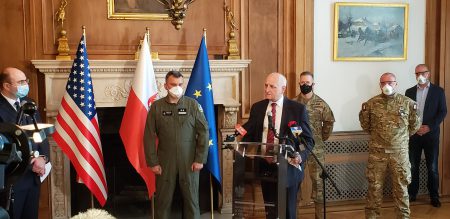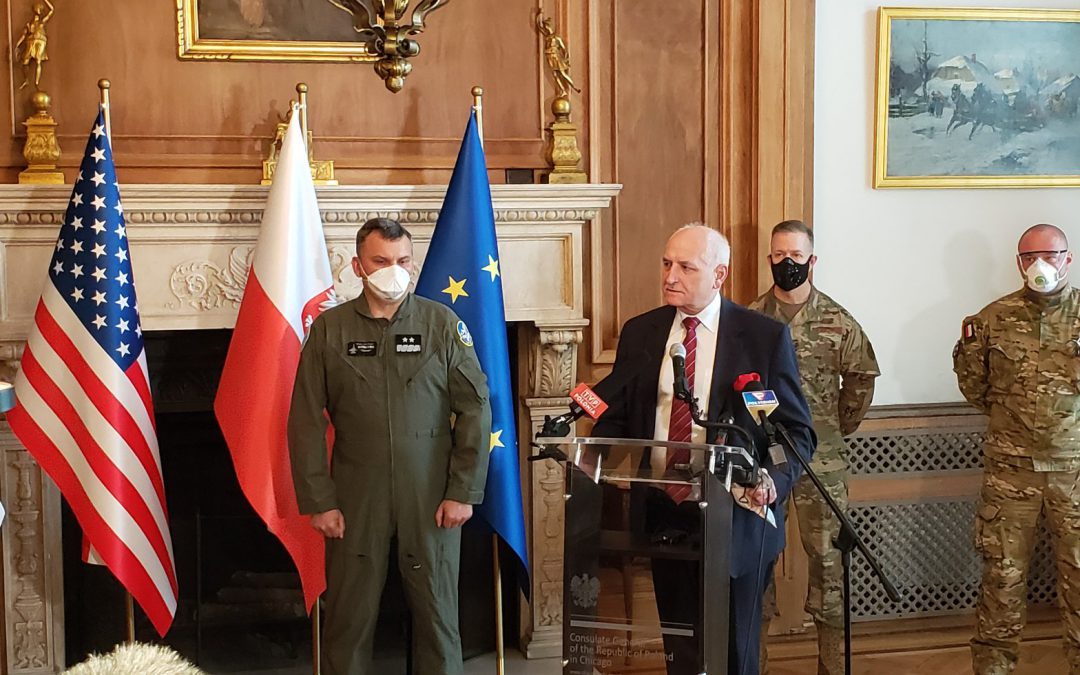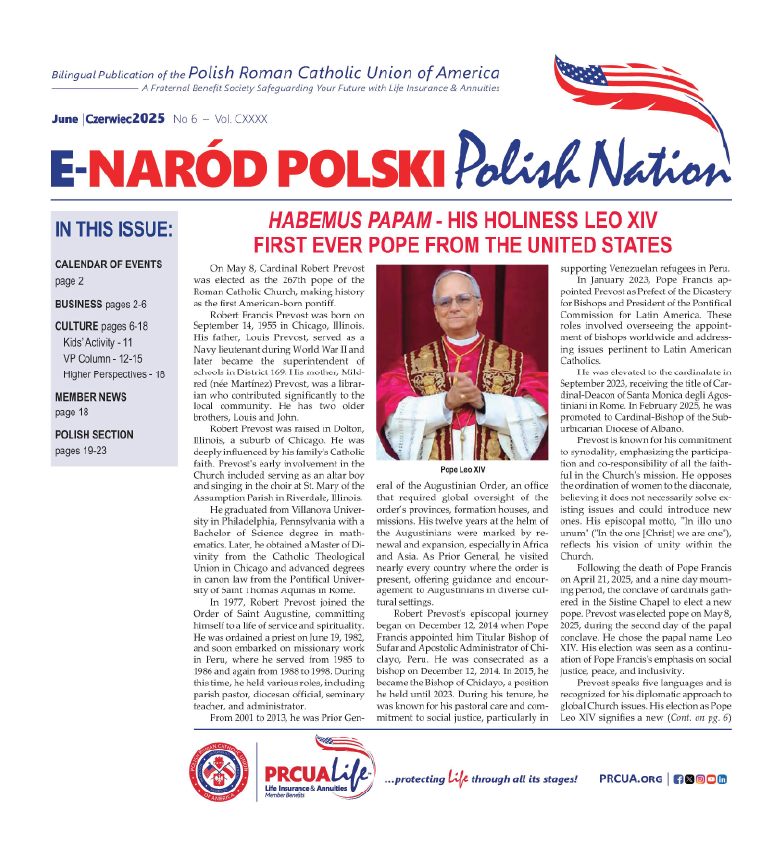An interview with prof. Marek Rudnicki – surgeon, director of surgical residence at Advocate Illinois Masonic Medical Center in Chicago, and a well-known Polish activist in the USA and the world who performs many social functions, including, until recently, president of the Polish American Medical Society in Chicago.
Elżbieta Sawczuk: We have been living with the coronavirus for some time, we are more and more familiar with our new reality and we have been learning more and more about the disease and how to protect against it. Let’s now focus on the future. What’s next? How long will the pandemic stay with us? There are opinions that there will be more waves, that COVID-19 will be a seasonal, recurring disease.
Marek Rudnicki: I do not rule out that COVID-19 will stay with us in the same way as other viral diseases. Views on the consequences of infection and the future of infection with this virus are very broad and vary widely between authorities. From those who say that this pandemic will quickly pass and it will remain but one event in the history of medicine and the history of civilization, to the chronic course of infection, which will have a similar form as the flu. The current pandemic, however, has special characteristics that we do not observe in other diseases: a disease developed within a few weeks that we did not deal with at the onset, and its dynamics were so intense that the world approached it completely unprepared. We watched alarming reports from China, then images from Italy, where hundreds of people died every day, people fainted and died in the streets, and hospitals were overcrowded. The whole health care system in many European countries collapsed. The analysis of the last six months indicates that despite hope and some knowledge already acquired, COVID-19 does not give up. New outbreaks are appearing, we still do not have an actual or effective treatment. COVID-19 seems more dangerous than the flu. One thing has probably succeeded—we can quickly diagnose the presence of the virus in the people who have become infected. Fortunately, this is not synonymous with their illness. At the present level of knowledge, it cannot be ruled out that this is a disease that we will have to deal with until we invent the right and effective method of prevention and even complete eradication of the virus. It should also be added that over time and exposure to the virus, many of us will gain resistance to subsequent infection and its potential complications. There has been information that only 15% of people with the presence of the virus have clinical symptoms, in other words, they become ill. We need to adapt to reality in order to somehow live even in the face of major difficulties. It is difficult to assess how long the fight against a pandemic will last, but the fight against its effects from many aspects will certainly take years.
ES: What is the treatment strategy of the coronavirus today? We know that the drug for malaria is being tested, and tests are being conducted on how the drug for Ebola works in the fight against COVID-19 symptoms. At what stage is the work on developing the medicine?
MR: It’s not easy to answer this question. Almost every day, we read information about new and supposedly effective methods of treatment, not only in medical journals but also in the media. The more they appear, the more cautious we should be when choosing a drug for COVID-19 treatment. Hasty and insufficiently documented information about the effectiveness of treatment leads to false hope, huge expenses and even deaths of people who would have a chance of survival if not for the side effects of an unchecked drug. During these few months we heard about Hydroxycholoquine, a medicine for malaria known for years, then about Colchicine, a drug for gout, now we hear about Dexamethasone, a steroid drug used for years in patients with various diseases, or the Remdesivir you mentioned that treats Ebola. Information appears, but then quickly disappears. The best specialists from around the world, as well as large and small companies are working on a way to treat COVID-19; everyone wants to develop an effective treatment. However, this will take time. Personally, I have the highest hopes for the Solidarity Trial, which has coordinated its research into the effects of treating patients in many countries in four different drug sets, including Hydroxychloroquine and Remdesivir.
ES: Will the announced, planned loosening of the restrictions be risky for us? What does it involve?
MR: Of course it is risky because it is associated with the fear of increasing the potential number of cases. On the other hand, I think that we have shaken off this initial shock, it is time to return to a normal life. We cannot afford to continue to maintain these restrictions. Subsequent countries are gradually loosening them, as well. We also know a bit more about the disease, we are more prepared as a society. However, we should definitely follow the recommendations related to these restrictions: “social distancing”, hand washing, masks, etc. People should also avoid meeting in large groups. All in all, I am in favor of submitting to the decisions of those who have more information, who better know the situation, and who, as a whole, are most interested in restoring normalcy. I don’t believe in any conspiracy theories. Their preachers do a lot of harm to individual people and society and the state, regardless of the country in which these absolutely unfounded theories preach. We should not allow them to penetrate our lives. Instead of seeking sensation, those who believe in it should get together and think about how to get out of this difficult situation as quickly as possible.
ES: How do you think the United States is dealing with the epidemic? There has been a lot of talk lately about the fact that measures to protect citizens against pandemics appeared too late, unlike in Poland.
MR: The U.S.A. suspended flights from China at the end of January, then other international flights shortly thereafter. These decisions were heavily criticized. Actual epidemiological restrictions were introduced during the first half of March. The United States had more time to prepare for the onset of the disease, to secure large medical centers. The States have the unusual ability to react quickly to various situations. In a short time, production of the equipment most needed to rescue patients was launched and thousands of hospital sites were established. The reaction was absolutely amazing. Fortunately, there was no need to use prepared beds in many of the places, and the current hospital system was able to secure treatment within its capabilities. I think that there are never too many such actions when it comes to human health and life. In retrospect, we perhaps could have implemented some actions earlier, but there were no reasons to take such action. It is good to be a judge at the moment, but in mid-March we were all shocked by the spread of the disease so quickly. Authorities in Poland responsible for decisions regarding pandemics are highly rated by foreign experts and given as an example of a country that has responded properly, quickly and appropriately to the threat of a potential virus. In Poland, however, after initial support, the Minister of Health has been criticized for many of its decisions. Decisions regarding the treatment of COVID-19 have become political, with support from the ruling party and much criticism from the opposition.
ES: I would like to return to the topic of the Polish medical mission that visited Chicago at the beginning of April. How do you assess the effects of this mission?
MR: It was not only an excellent political and friendly gesture on the part of President Andrzej Duda and the Polish government, but also in a purely human dimension. Nine people with several weeks of experience with the first line of the fight against coronavirus in Italy came to the United States in mid-April to share their experience with the virus. It should be noted that this was the first group of doctors from Europe who came to the U.S.A. since the outbreak of the pandemic. Their trip here was at purely the expense of the Polish government in the hope that these doctors will transfer their skills and experience to the United States, and at the same time see how the U.S. preparing itself to fight the virus, how people react, whether they have similar or different treatment methods, and whether the logistics of preparation is similar to that in Poland. The doctors will be able to use these experiences in their treatment of patients in Poland. Of course, there were some differences. Hospitals in which COVID-19 treatment centers were established in Poland were created on a much smaller scale. In turn, the U.S. is a powerful country, it has many possibilities, such as creating a medical center for three thousand beds at McCormick Place beds. Polish doctors shared their experiences during numerous meetings with the administration, doctors and residents in Chicago Hospitals, during meetings with the Illinois authorities, the management of the public health department and the Illinois National Guard. Based on the level of interest on our part, much of what was discussed is being used here in the U.S. On the other hand, the members of the Mission became acquainted with the methods and logistics of combating COVID-19 at various levels of crisis response in the U.S.A. The head of the mission was invited to and participated in the meeting of the Presidents of the U.S.A. and Poland in the White House at the end of June.
ES: What actions did the Polish American Medical Society in Chicago take to help Polonia find a new reality and fight the coronavirus?
MR: At the end of February, the Polish American Medical Society in Chicago decided that it is our duty to help the Polish community in the fight of the coronavirus. This aid came in many forms. We have launched a helpline for people who speak Polish: 1.855.WIRUS19. To date, we received hundreds of calls from patients. People were scared, they didn’t know what to do. People called if they coughed or their temperature rose. Because many doctors closed their offices in this first phase, information available by phone played a very important role. We directed people to hospitals where they could be treated immediately. Their recoveries are a testimony of the effectiveness of our actions. In addition, we provided Polish and English information to doctor’s offices, what to do, how to identify the symptoms and where to seek help. We updated and published information on the website daily based on what was reported by the Atlanta CDC and the Illinois and Chicago Departments of Public Health. Through lobbying pressure, we arranged that information provided by organizations responsible for public health was also provided in Polish. In addition, beginning March 6th, we run a daily information broadcast on Polish radio, where we talk about various health and issues related to the pandemic. Over twenty doctors in various specializations from Chicago, other U.S. cities and Poland participated in these broadcasts. Thanks to the internet, this information was broadcasted in Polish communities throughout the world. We have assumed the organization of meetings of the Medical Mission in Hospitals with the medical community of the Polish community abroad in Chicago and around the world. And although not all were saved, we still keep in our hearts the opportunity to help everyone and everyone who came to us for help.
ES: What are your most important recommendations for us to minimize the risk of developing COVID-19 in the upcoming weeks as a result of the loosened restrictions?
MR: In general, use common sense. Do not leave the house, do not congregate in large groups if you do not have to. Continue social distancing (six feet away from people). It often seems awkward and troublesome, but it still protects us. Avoid large gatherings because they are still prohibited and not safe. Mask use will continue for some time. Continue basic hygiene, such as frequent hand washing and disinfection. I think that most of us will soon acquire resistance to the virus, which will reduce the number of cases. Let’s not forget that the most vulnerable people to COVID-19 and the associated complications are those people who have various types of pre-existing medical conditions. So, in general, everyone needs to take care of his or her health. I would also like to extend my wishes for good health to all members of the PRCUA, so that the organization continues to prosper. Together we will overcome everything and better times await us. All the best!
ES: On behalf of all the PRCUA members, the Executive Committee and the Board of Directors, thank you for taking the time to provide so much valuable information.

Press conference of the Polish Medical Mission at the Polish Consulate in Chicago. Photo by Andrew Mikołajczyk


